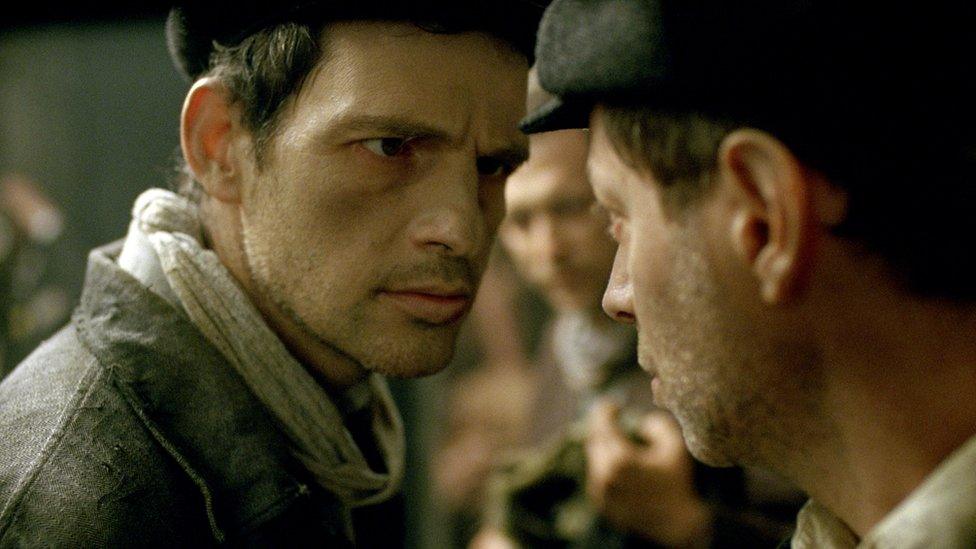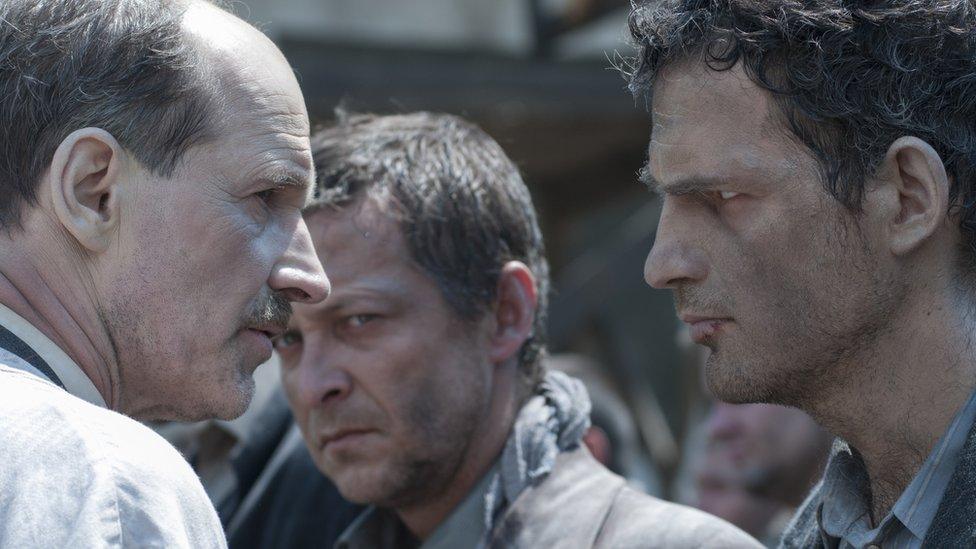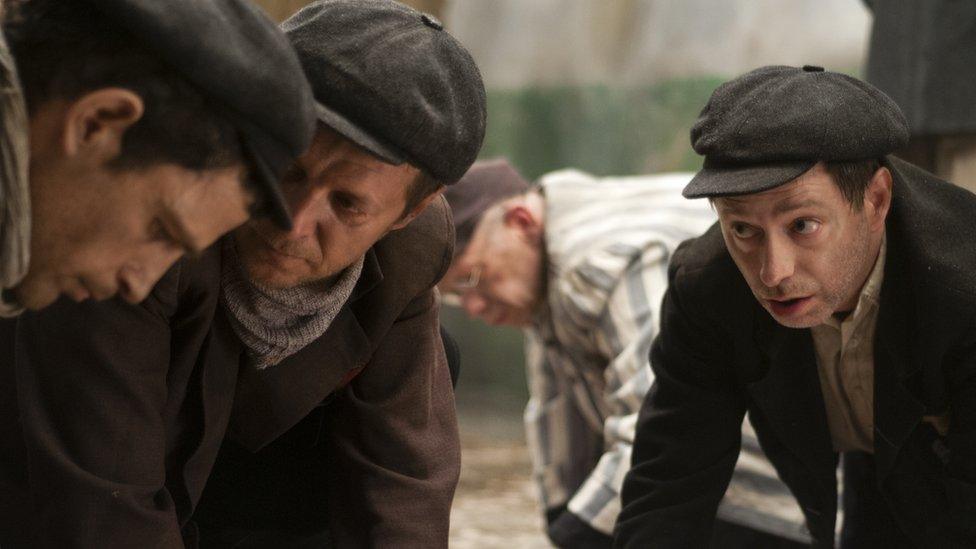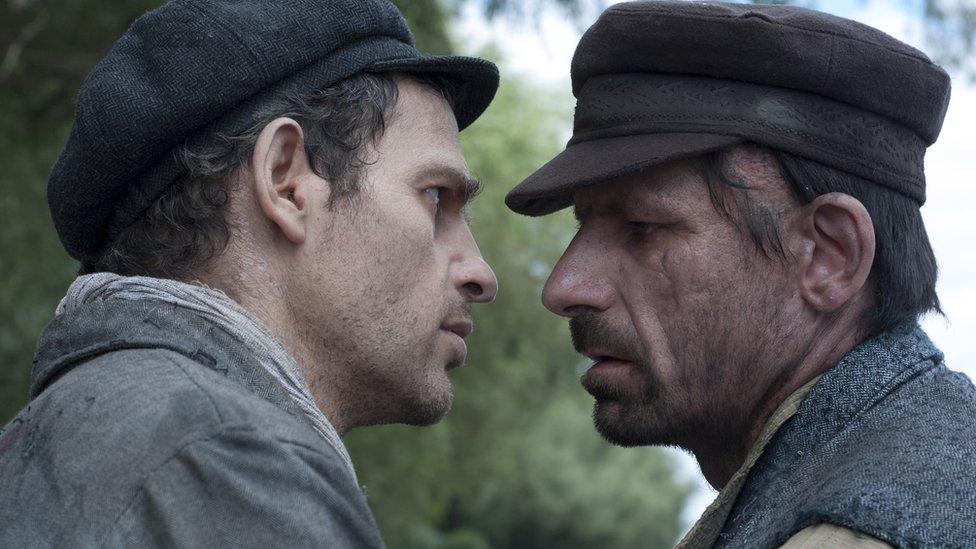Holocaust film Saul's 'struggle to remain human'
- Published

It's rare for a film to win an Oscar, a Golden Globe and the jury prize at Cannes, while at the same time being described by critics as "excoriating", "harrowing" and "unbearable to watch".
What makes Son of Saul's success even more extraordinary, however, is that it's a debut film - the first feature-length movie made by Laszlo Nemes, a 39-year-old Hungarian director.
The foreign language Academy Award-winner is set in Auschwitz-Birkenau concentration camp in Nazi-occupied Poland in 1944, where Jewish prisoner Saul works as a sonderkommando - someone who incinerates the dead in the crematorium. When he discovers the body of a child he thinks is his son, he risks everything to give the boy a dignified Jewish burial.
With no soundtrack apart from the sounds of the camp - banging doors, the scraping of shovels, the screams of prisoners - Son of Saul also focuses almost entirely on the face and movements of the lead actor, Hungarian poet Geza Rohrig. The background is a blur, although the audience is still aware of the horror unfolding around him.
"I wanted everything to come down to one man's suffering," says Nemes. "It's like making a portrait of someone. I thought if the audience could immerse themselves in one person's experience, then you could capture what it meant to be there on a visceral level. Too often the Holocaust is about the masses; it has lost its face."
This was also Rohrig's first film. He describes its effect on the audience as "a punch to the throat".

Director Laszlo Nemes read accounts of the sonderkommandos' experiences
"My main task was to separate the feelings of myself as an actor and myself as a man," he says. "I had to avoid all sentiments and feelings, just to give Saul an intensity about him.
"The sonderkommandos had a stay of execution while they performed the work of the camp, but they alone out of all the arrivals at Auschwitz knew for certain that death was coming for them."
Nemes says: "This is about Saul's struggle to remain human when there is no more humanity. That's my question for audiences: is it possible to still have a voice within you, an inner God, in the middle of hell?"
Filmed in just under a month, outside Budapest, Nemes used an agricultural warehouse and points out that "Auschwitz was a factory, it just happened to be a factory of death".
"When people arrived, it just seemed like an ordinary building," he says. "Because of the significance it has in retrospect, people have forgotten that. We wanted to keep the everyday - how very real and very ordinary the horror was."
Nemes developed the script with his co-writer Clara Royer over the past decade, after reading accounts of the sonderkommandos' experiences.
But his refusal to tone down his vision meant he was turned down for funding in France, where he moved to at the age of 12, and Israel, as well as Germany and Austria. He eventually raised the £1m budget from the Claims Conference, which supports financial restitution for victims of the Nazis, as well as the Hungarian Film Fund.

Director Laszlo Nemes: "For the film to first be seen in the year of the Charlie Hebdo attacks in Paris, it's a prophetic vision of what happens when people lose tolerance"
As well as its international acclaim, Son of Saul has gone on to become Hungary's biggest independent film at the box office, but at the time of release there were media reports of anti-Semitic abuse on social media, calling the film "Jewish propaganda".
The director, who lost his great-grandparents to the Holocaust, among the 400,000 Hungarian Jewish people deported to Auschwitz, says he felt impelled to make the film "for a younger generation who now have the distance of time between us and the reality of what happened".
"For the film to first be seen in the year of the Charlie Hebdo attacks in Paris, it's a prophetic vision of what happens when people lose tolerance," he says.
"You only have to read the news to know that history did not turn a page after the Nazis - we have to keep telling this story over and over again. I want this generation to consider the evil that still exists within us as humans."

The director wanted the film to be as pared down and realistic as possible
Many films set around the Holocaust have found box office and critical success, from Steven Spielberg's Schindler's List, to Roberto Benigni's 1997 hit Life Is Beautiful, and 2007's foreign language Oscar winner, The Counterfeiters.
Nemes says he rejects "the Hollywood version" of the concentration camps, but says he understands "that the storyteller often wants to focus on acts of heroism, and the will to survive".
"As humans, we want to hear about people who make it through impossible odds," he says..
"However, the testimonies I read for this film were not those of survivors - they were from people working inside the camps who were just desperate for their reports to get out to the outside world. The rule of these places was death, and survival was often a complete accident."
Son of Saul is released in the UK on 29 April.